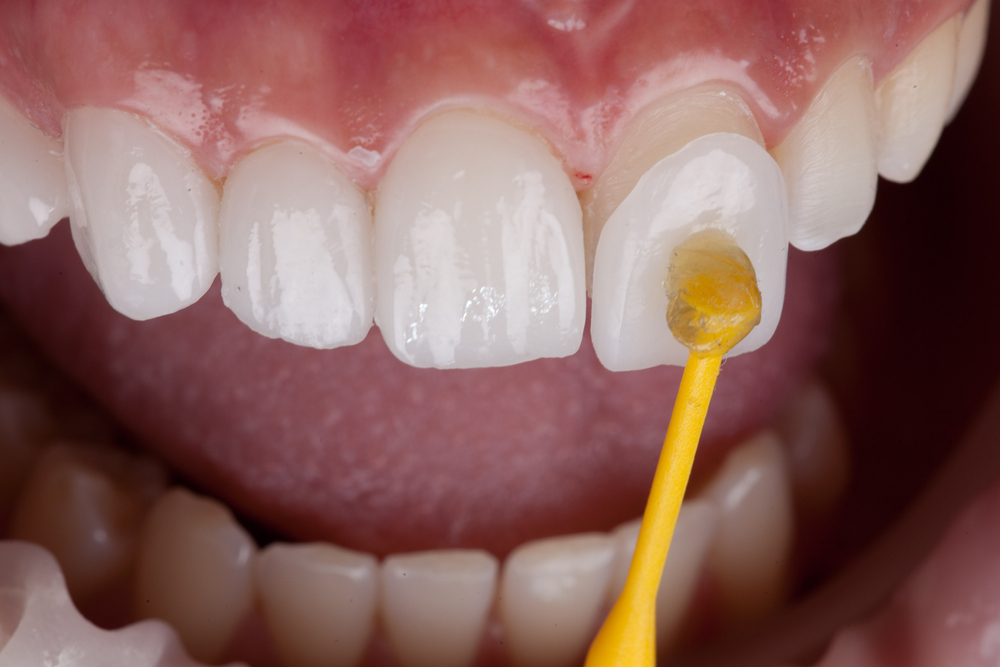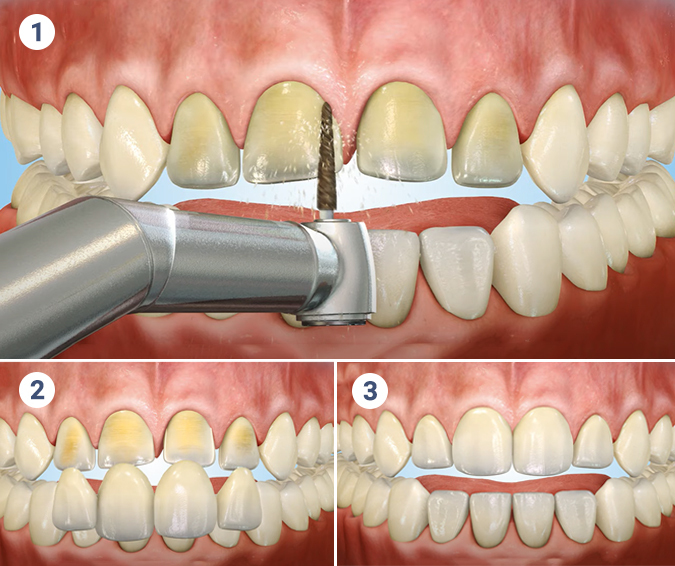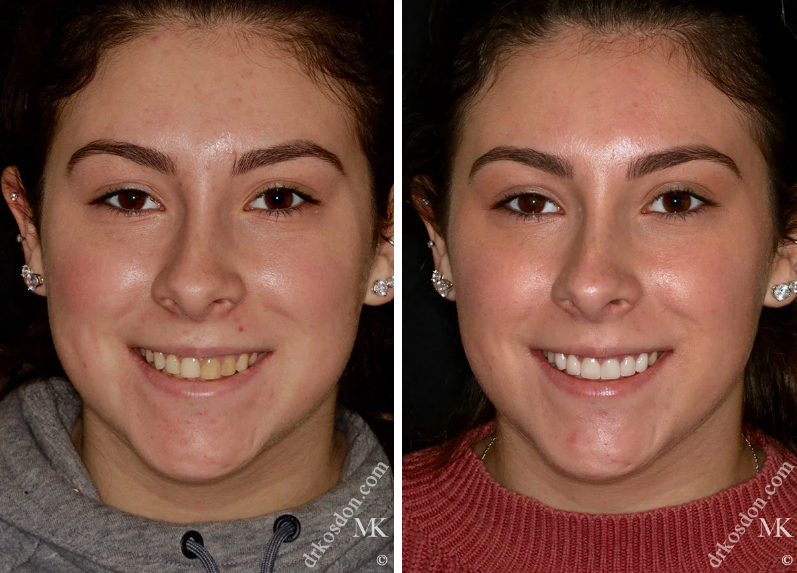Understanding Veneers Teeth Options for a Brighter, Confident Smile
Opening the Keys of Veneers: Truths, Types, and Benefits for a Gorgeous Smile
Veneers provide a compelling remedy for those looking for to boost their smiles. These oral improvements can attend to different blemishes, from staining to imbalance. With choices like porcelain and composite, people can select based on their demands and choices. Nevertheless, comprehending the nuances of veneers, including application and treatment, is important. What variables should one consider before making a decision? The responses might stun those interested in this aesthetic oral alternative.

Recognizing Veneers: What Are They?
Veneers are thin, customized shells made to cover the front surface of teeth, boosting their appearance. Generally crafted from sturdy products, these shells are customized to fit each individual's teeth exactly. They serve multiple objectives, consisting of dealing with visual blemishes such as discoloration, chips, or voids. The application procedure includes a dental expert preparing the teeth, usually by getting rid of a tiny amount of enamel to assure a snug fit. When prepared, the veneers are bound to the teeth using a strong adhesive.
Clients commonly pick veneers for their ability to develop a natural-looking smile while providing a long-lasting remedy to dental imperfections. Unlike other cosmetic dental care options, veneers call for very little intrusive procedures, making them a prominent option. The outcome is an improved smile that can substantially enhance a person's self-confidence and self-esteem. Generally, veneers provide a reliable method to accomplishing an extra unified and attractive dental appearance.
Sorts of Veneers: Porcelain vs. Composite
When considering cosmetic oral choices, two primary types of veneers attract attention: porcelain and composite. Porcelain veneers are crafted from a long lasting ceramic product that mimics the all-natural look of teeth. They are known for their discolor resistance and capability to show light in a similar way to natural enamel, supplying a visual charm that lots of clients desire. The application procedure generally includes more preparation of the tooth framework and may require numerous check outs to the dental practitioner.
On the various other hand, composite veneers are made from a tooth-colored material that is directly applied to the teeth. This type enables quicker application and can frequently be finished in a solitary visit. While they are less costly than porcelain veneers, they may not supply the same durability or resistance to staining. Ultimately, the option between porcelain and composite veneers depends on private choices, budget plan, and particular oral demands.
The Advantages of Deciding On Veneers
Choosing veneers provides many benefits that can substantially enhance both the looks and capability of an individual's smile. Among the primary benefits is their ability to remedy flaws such as staining, gaps, and imbalance, causing a more uniform look. Veneers can likewise improve the durability of teeth, giving a protective layer that guards them from damage.
They need minimal tooth prep work compared to various other dental treatments, preserving even more of the natural tooth framework. This preservation adds to a healthier dental setting while still attaining a stunning smile.
Veneers are very customizable, enabling people to select the form, dimension, and shade that finest matches their choices. Furthermore, they are stain-resistant, making it less complicated to keep a eye-catching and bright smile over time. Generally, veneers present an effective option for those looking for both aesthetic enhancement and long-lasting dental health benefits.
The Veneer Application Refine
The veneer application procedure entails numerous crucial steps to guarantee suitable outcomes. At first, an examination is performed to analyze the patient's demands, followed by the preparation and shaping of the teeth. Finally, the veneers are bonded in position, with adjustments produced an excellent fit and look.
First Consultation Steps
A detailed first consultation is necessary for anyone considering veneers, as it establishes the structure for an effective therapy. During this meeting, the oral expert evaluates the individual's oral health and wellness, reviewing any type of existing concerns that can affect the veneer application. This evaluation might include X-rays and an aesthetic evaluation to figure out the problem of the gums and teeth.
The dental expert likewise engages the patient in a thorough conversation concerning their visual goals, choices, and expectations. They might offer numerous veneer choices tailored to the individual's details needs. In addition, the professional discusses the procedure, potential risks, and aftercare needs, ensuring that the patient is comfortable and knowledgeable before continuing with the treatment.
Preparation and Forming Teeth
After the preliminary consultation, the next stage includes the prep work and shaping of the teeth to fit the veneers. This important action is done by the dental practitioner, who thoroughly examines the tooth structure to identify the quantity of enamel that needs to be removed. Normally, a slim layer, typically around 0.5 millimeters, is slashed off to assure a correct fit for the veneers. Accuracy is extremely important during this procedure, as it impacts both the visual end result and the overall convenience. As soon as the teeth are sufficiently shaped, impacts are required to create customized veneers that line up completely with the person's oral account. This thorough prep work sets the stage for a successful veneer application, boosting both look and function.
Bonding and Final Adjustments
Following the shaping and preparation of the teeth, the bonding procedure begins, noting an essential stage in the veneer application. During this stage, an oral adhesive is related to the ready tooth surface area, assuring a strong bond in between the veneer and the tooth. The dental practitioner meticulously positions the veneer, making adjustments to attain the wanted alignment and appearances. When properly put, an unique light is made use of to cure the sticky, strengthening the bond. After healing, the dental professional conducts final changes, cutting any kind of excess product and fine-tuning the veneer's shape to assure a natural this look. This cautious focus to detail boosts both feature and looks, adding to a general stunning smile that is lasting and durable.
Taking care of Your Veneers: Maintenance Tips
Caring for veneers is vital to preserve their look and durability. A consistent daily cleansing regimen, mindful evasion of staining foods, and normal dental exams are essential parts of efficient upkeep. These practices aid guarantee that veneers remain in peak condition and remain to boost one's smile.
Daily Cleaning Routine
Routinely keeping veneers is essential for their long life and look. An appropriate daily cleansing regimen can assist protect their shine and protect against damages. Dental practitioners recommend brushing two times a day with a soft-bristled toothbrush and fluoride tooth paste, guaranteeing that all surface areas are cleansed gently to prevent damaging the veneer surface. Flossing everyday is likewise important to remove food bits and plaque from in between teeth, where brushes may not reach. In addition, utilizing an antimicrobial mouthwash can assist preserve dental health without hurting the veneers. It is recommended to stay clear of abrasive cleaners and tools that can damage the veneer. By following these basic actions, people can keep their veneers looking stunning while advertising overall oral health and wellness.
Avoiding Discoloration Foods
Veneers are designed to enhance the look of teeth, their susceptibility to discoloring demands cautious nutritional choices. It is necessary for people with veneers to be conscious of particular foods and drinks that can lead to discoloration. Dark-colored products such as coffee, merlot, and berry juices must be eaten in small amounts, as they are understood to stain both all-natural teeth and veneers. Furthermore, acidic foods like citrus fruits container deteriorate the bonding agents utilized in veneers, making them much more susceptible to staining. To maintain a bright smile, it is a good idea to rinse the mouth with water after eating discoloration foods and to exercise routine oral hygiene. These thoughtful selections add significantly to the durability and aesthetic appeals of veneers.

Regular Dental Check-ups

Maintaining the integrity of veneers requires a commitment to routine oral check-ups, as these appointments play a vital duty in ensuring their longevity and appearance. During these brows through, dental professionals can evaluate the condition of the veneers, checking for any indicators of he said wear, damages, or underlying oral problems. In addition, regular cleanings aid get rid of plaque and tartar that can gather around the veneers, promoting general oral health. Dental practitioners can additionally offer tailored suggestions on treatment strategies and items fit for veneer maintenance. By sticking to a routine of exams, people can attend to prospective troubles early, ensuring their smile remains gorgeous and vibrant. Ultimately, normal oral gos to are a vital element of veneer treatment.
Is Veneers the Right Alternative for You?
Making a decision whether veneers are the right alternative commonly depends upon specific visual goals and oral requirements. For those seeking to address concerns such as discoloration, chips, or imbalance, veneers can supply a transformative remedy. Prospects normally include people with healthy teeth but want an improved smile.
Nonetheless, it is important to take into account aspects such as tooth enamel problem, the level of oral problems, and the desire to keep veneers - Dental Veneers. Consulting with an oral specialist is necessary, as they can examine oral health and identify if veneers appropriate
Furthermore, possible prospects need to review the lasting dedication, as veneers may need substitute every 10-15 years. Cost considerations likewise play a substantial function, as veneers can be a significant investment. Inevitably, the choice should be well-informed, balancing visual wishes with sensible considerations for enduring outcomes.
Regularly Asked Inquiries
For How Long Do Veneers Commonly Last Before Needing Replacement?
Veneers typically last between 10 to 15 years before needing replacement. Factors such as oral hygiene, way of living selections, and worldly high quality can influence their durability, making routine dental examinations crucial for maintaining their problem.
Are Veneers Safe for Individuals With Sensitive Teeth?
Veneers can be safe for people with sensitive teeth, but it typically depends upon the seriousness of level of sensitivity and the dental professional's strategy. Consulting an oral expert before proceeding is vital to ensure ideal results.
Can Veneers Be Gotten Rid Of or Replaced Conveniently?

Do Veneers Spot With Time, and Just How Can I Prevent It?
Veneers can stain over time, particularly from foods and beverages like coffee or red white wine. To stop staining, keeping excellent dental hygiene, making use of a straw for beverages, and routine dental cleanings are recommended practices.
What Is the Price Variety for Obtaining Veneers?
The price of veneers typically ranges from $500 to $2,500 per tooth, relying on variables such as material kind, dentist experience, and location. People must speak with oral experts for customized quotes and financing options.
Once the teeth are properly shaped, impressions are taken to produce custom-made veneers that align flawlessly with the person's oral account. During this stage, a dental adhesive is used to the prepared tooth surface, assuring a solid bond between the veneer and the tooth. It Website is vital to take into account variables such as tooth enamel problem, the extent of oral concerns, and the willingness to maintain veneers. Veneers can be secure for individuals with delicate teeth, yet it usually depends on the intensity of sensitivity and the dental professional's strategy. The price of veneers usually varies from $500 to $2,500 per tooth, depending on aspects such as material type, dental practitioner experience, and place.